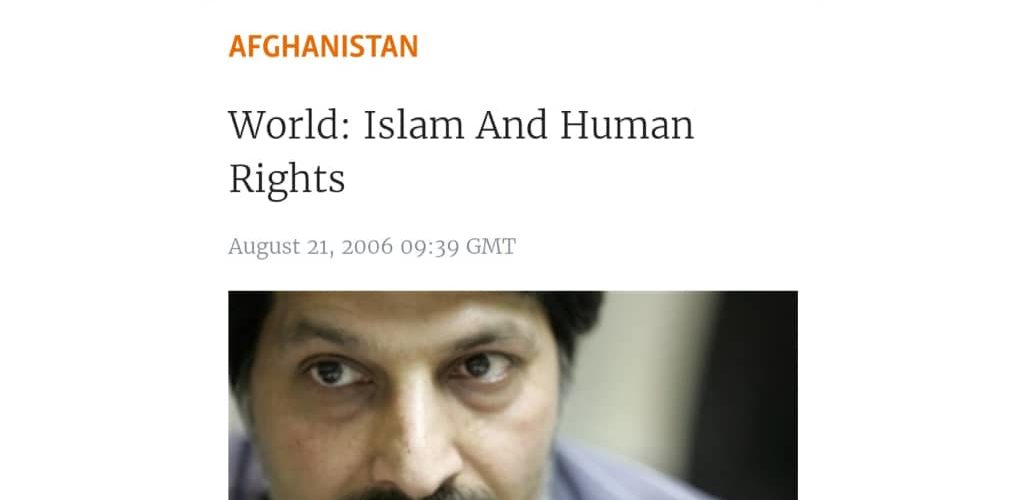Radio Free Europe
Radio Lebirty
https://www.rferl.org/a/1070707.html
August 21, 2006
Emad Baghi (AFP)Is the concept of an Islamic state compatible with accepted notions of human rights? Can the modern concept of human rights make headway in the face of religious dogma and Islamic traditions? Emad Baghi, the head of the Tehran-based Organization for the Defense of Prisoners’ Rights, knows at first hand the political sensitivity of new interpretations of religious texts, especially those involving human rights and the death penalty: in 2000, Baghi, then the editor in chief of the journal “Fath,” was sentenced to 7 1/2 years in prison for writing about the death penalty and retribution, as well as the killing of political and intellectual dissidents.
In this interview, Baghi, who was released in 2003 after three years in prison, explains the difficulties of securing respect for human rights in Muslim countries as a result of the eclipse of a deeply rooted humanist tradition in Islam. In answers given to Fatemah Aman of Radio Farda, he sketches out the battle lines in debates about human rights — within Islam, within Iran, between the secular and religious of all religions, and between tradition and modernity — and argues that there are traditions both of Islamic law and Islamic mysticism in which modern concepts of human rights can be bedded. Tradition and modernity can coexist in Islamic society, he maintains, and those who want to promote human rights need to explore those religious traditions.
RFE/RL: The basic document of human rights is known as the Universal Declaration of Human Rights. The term ‘universal,’ while primarily referring to the basic premise of the universality of human nature and human dignity, has a connotation that the principle is universally applicable both in the orient and the occident, but many in the West are deeply suspicious of the ability of the Islamic society to embrace human rights. That suspicion is also shared by many secular intellectuals in Islamic countries. Do you essentially see the issue of human rights as a Western concept, and can human rights exist within an Islamic context?
Emad Baghi: In recent years there has been a discourse — reflected in numerous books and publications and represented within the Iranian religious circles by the supporters of Ahmad Fardid [a thinker considered to be an advocate of Islamic ‘authenticity’ as a remedy for ‘West toxification’; he died in 1994, aged 90] — that preaches that the West is entirely evil. This view charges that the West is constructed and governed based on man-made rules and laws, is entirely based on human egotism, and is therefore satanic. In contrast, they try to paint a spiritual and charismatic picture of the Orient. This is a dogmatic, undifferentiating approach to a complex problem. Advocates of this view proclaim the rejection of the West in its entirety rather than the selective reception and rejection of different aspects of Western culture. Ironically, though, these same people in practice adopt many elements of Western culture and technology; they fly in airplanes and wear Western-style suites, but when it comes to democracy and human rights they return to their dogmatic view.
On the other side of the aisle there are people who neither see the West nor the East as unified entities. Advocates of this view want to adopt those elements of the Western value system that are consistent with the indigenous culture.
RFE/RL: How does the latter group view the compatibility between human rights and Islam?
Baghi: Well, there are different views on this subject. One group believes that there is no conflict between Islam and human rights and that both can coexist. This view holds that if one side starts from a standpoint of logic and another from revelation both can reach the same point on the subject of human rights. Another group attempts to approach this issue from the angle of social sciences. This view considers the notion that there is a contradiction between Islam and human rights as a declaration of war on millions of Muslims around the world, and that this would push those masses to take up a position against human rights. So, the second group has a more political approach to the issue. However, whatever the source of their views, both these groups maintain that Islam and human rights are compatible.
Such views are opposed by a secular camp that sees religion and Islam in sharp contrast to human rights. This group argues that religion is based on worship, revelation, and the inflexible teachings of a god, whereas human rights are a secular phenomenon and a product of the modern world. Any attempts to forge an identity between the two would cripple the concept of human rights, advocates of this view argue. They think that any such attempt would only serve to rescue religion. This is a radical view based on secularism.
RFE/RL: And where does Emadeddin Baghi stand in this issue?
Baghi: I believe that we must first realize that the foundations of the modern concept of human rights were laid less than two centuries ago. Those have then been developed in more recent times. Central to the concept of human rights is individualistic humanism and human dignity. The judicial basis of the modern world is centered on this dogma. If we accept this as fact and look at our own cultural heritage, we see that such elements have indeed existed in our culture. In gnosis [the Irfan tradition of mysticism, particularly prevalent in Iran and Shi’ite Islam] and Sufism, there is little or no attention paid to religious expressions. It is often hard to determine whether a mystic is a Shi’a or a Sunni. An appreciation of human dignity is prominent in gnostic texts. There is an overwhelming body of evidence in this regard. Here, I would like to refer just to the poetry of [Sa’ad Uddin Mahmud] Shabestari [an Iranian mystic writer and poet (c.1250 – 1320)]. There are several references in his poems that emphasize the centrality of humans in his world view. Such examples can also be found in the Koran.
So we do have this philosophical, humanistic view both in our gnosis and in Islam. However, this view has been reduced and transformed into a view that is inflexible, limited, and based on jurisprudence. In fact, the entire religion has been reduced to jurisprudence and decrees issued in religious dissertations. It is this reductionism that has prevented the humanistic views expressed in our ancient literature from flourishing. If these views had not been victimized by religious reductionism, we would have had a much less totalitarian structure of power through the centuries.
The Eclipse Of Islamic Humanism
RFE/RL: I suspect we are entering into a highly controversial area. Scholars and intellectuals differ widely on the question of what caused the Islamic world to fall to a lowly position by almost all standards of modern civilization. Traditionally, intellectuals in the developing world tend to blame the West. Are you proposing a revisionist view?
Baghi: I believe that the demise of the humanistic view, which was deeply rooted in our classical literature, has resulted in the persistence of totalitarian systems in which human dignity has no place and in which everything is political and ideological. That is the main source of the decline of Islamic civilization. Some blame colonialism and imperialism for this failure. I believe that the main cause — an indigenous cause — was dictatorship and a lack of freedom, although colonialism contributed to this since these two phenomena were mutually dependent: naturally, the colonial powers needed stable and powerful governments in these countries to be able to exploit their resources – and only dictators could achieve that.
RFE/RL: I want to go back to our discussion of human rights. You admit that the concept of human rights is a modern phenomenon, although you believe that the concept existed in some form in Islam but failed to flourish. Is this specific to Islam or did other religions also praise human rights before it was invented by modern intellectuals?
Baghi: No. This is not specific to Islam. Many Western scholars point to the roots of the concept of human rights in Christianity and argue that progressive Christian clergy — and particularly the Christian gnostics — prepared the ground for the development of the human-rights concept. At the same time, though, the Universal Declaration of Human Rights and other human-rights documents are absolutely silent about the influence of religion on the human-rights paradigm. This is regrettable given that many of the founders of this world view and activists of the struggle for human rights were indeed religious figures and intellectuals. Perhaps they wanted to avoid controversial issues or it may relate to the fact that at the time that these documents were produced half the world was under the rule of Marxists while in the West secular governments were in power. However, history is clear on this issue. In both Islam and Christianity there are different interpretations: some are anti-human and anti-human rights, and others preach tolerance and respect for human rights. Several scholars actually believe that the key to the initial rapid success of Islam was this tolerance and the humane treatment of followers of other religions and even of non-believers. That is exactly what human rights is. These scholars believe that the expansion of Islam only stopped when tolerance was replaced by religious dogmatism and rigidity.
Human Rights, Tradition, And Modernity
RFE/RL: Given how deeply rooted dogmatism and rigidity are, do you think it was even possible to spread human rights in Islamic countries?
Baghi: To answer this question we have to go back to a more fundamental question, and that is the relationship between tradition and modernity. There are two views on this issue. In the first view, modernity starts where tradition ends. In the process of its development, society disconnects itself from tradition and enters the era of modernity. The other view considers modernity and tradition as a continuum. One cannot absorb modernity at the expense of a total denial of tradition. Indeed, experience shows that those societies that have adopted modernity slowly while continuing to nurture their traditions have a more robust modern structure. Societies can reconstruct, redefine, and reinterpret their traditions; by applying the positive elements of their cultural heritage and adapting them to the principles of modern life — such as, human rights — they can create a solid basis for modernism. The elements of modernity need to be internalized and adapted to indigenous values.
I tend to believe in the second approach. The history of modernism in Europe teaches us that this approach would result in more stable and better-rooted modern relationships within society.
It is the first approach that serves as a basis for the conclusion that human rights is essentially a Western concept since the first declarations of human rights were produced in the West. Well, if we go back to Iranian history we find many documents from Cyrus the Great on human rights. Would it be right to label human rights as an Eastern concept because of these historical documents? That would be as wrong as the first conclusion. East and West have influenced each other tremendously over the course of history. William Durant [an American philosopher, historian, and writer who lived from 1885 to 1981] argues that experimental thinking was adopted by Westerners from Muslims during the course of the Crusades. We should not have a geographic view of these processes. We should not create a false dualism between these two geographic entities and expand this to issues such as modernity and human rights. Culture should not treated in the same way as machines and technology. These are fluid issues; they are the software of Nature. If we approach modernity in this way or attempt a complete departure from tradition, modernity will become a crisis in itself.
A Dynamic, Non-Ideological Approach
RFE/RL: So, as I understand it, you are setting limits on modernity and accept it only when it does not repudiate tradition.
Baghi: I believe we should have a critical approach to both views. Some people try to adapt human rights to religion or tradition and accept only those elements of human rights that agree with that religion and discard all other elements. On the other side of the aisle, some do the same with modernity. You cannot do the same with modernity that fundamentalists do with religion. In other words, you should not transform modernity into an ideology based on eternal, inflexible values and accept religion only where it completely agrees with these values and discard the rest. We need to approach these concepts critically and realize that all these concepts are dynamic and in the process of development. When we talk about religion, we are actually talking about the human perception of religion that has materialized in the writings of religious thinkers over the centuries. The human perception of religion is fluid and dynamic and has constantly changed, just as human understanding of nature and society has. The concept of human rights is also one of these dynamic human perceptions. So we should see this process of evolving perceptions as a continuum in which human experience has developed refined versions of certain concepts. Instead of condemning tradition and religion in its entirety, we need to refine it. The same principle also applies to concepts of modernity. If we do not do this, we make a religion out of modern concepts such as human rights. An ideological approach to human rights would prevent it from being developed. For example, the initial concept of human rights was based on individualistic liberalism. However, this was criticized and challenged by socialists and by Marxists. There is now a third generation of the human-rights concept, which is influenced by socialist teachings but still maintains elements of the individualistic liberalism. Many aspects of the new human-rights concept are social rather than individual. In the early days of human-rights discourse, human rights was considered a natural and instinctive right. But many philosophers challenged this view later.
Many agree on the philosophical basis of human rights but disagree on aspects of the practical forms it has assumed in real political life. There are others who may challenge the concept at its philosophical root but agree with it as a form of policy.
RFE/RL: To which group does the ideological mentor of President Mahmud Ahmadinejad, Ayatollah Mesbah Yazdi, belong?
Baghi: Mr Mesbah belongs to a third group that does not believe in either. They may verbally support certain aspects of human rights, but these are not major issues for them. They do not believe in the most basic principles of human rights.
We have seen these types of dilemmas in the West too. Many philosophers disagreed with the notion that human rights have a basis in natural and instinctive rights. At the same time, many of these philosophers did respect the content of the human rights as a social contract. So we see that these challenges and discussions existed in the West. If they had treated human rights as a religion, the concept would have never developed to its current degree. To make a long story short, I believe that we have to confront both religion — or, it would be better to say, the human understanding of religion — and modern concepts such as human rights using an approach that is critical and free of dogma. Both fall within the category of human knowledge and we cannot mystify one and then try to adapt the other to it.
RFE/RL: One of the criticisms that you have expressed toward thinkers, such as the Iranian philosopher Abdolkarim Soroush, is that you want them to avoid the type of language that could provoke religious people and elicit harsh responses from the clergy. Do you think that modernist Islamic intellectuals could use a different approach to convey their message that would be more acceptable to Muslims? Or are you appeasing the religious conservatives?
Baghi: For a thousand years ago we have had one principal paradigm that has served as the basis for the whole of Islamic jurisprudence. This is about the division of Shari’a instructions into two groups: primary rules, and secondary rules. Primary rules are those spelled out in Islam’s original text, namely, the Koran. These rules come directly from God.
The secondary rules are ones derived from the religious reasoning of individual Ulemas [Muslim clergy]. The belief is that, through this process of reasoning, the Ulemas endeavor to comprehend the primary rules. They try to interpret the verses of the Koran, but that does not necessarily mean that the verse is understood. This interpretation of the primary rules is what we call the human understanding of the Shari’a, as opposed to the primary rules themselves, which is what we call religion. What is termed as “religious comprehension” by the Ulemas is equivalent to the secondary rules or the religious reasoning of the Ulemas. According to the Shi’a conviction, a jurisprudent who tries to interpret the primary rules is doubly rewarded if he succeeds in making the correct interpretation. But he may be wrong in his interpretation, in which case he will be rewarded only once, for attempting to understand the law. We should not equate our understanding of the primary rules with the religion itself.
Sometimes issues are presented in a way that would provoke opposition by some of the Ulemas who have been teaching many of these ideas for years, so the manner of presentation could create a misunderstanding. Instead of trying to portray modernity and human rights as a concept that contradicts some aspect of our religious understanding, we should say that contradictions are of a solvable nature.
Avoiding The Extremes
RFE/RL: I want to turn to another point that you have raised in your writings. You indicate that radicals and extremists from different religions or political tendencies somehow converge. Can you elaborate?
Baghi: Sometimes people use language that produces a result that is the opposite of the one intended. They explain modern concepts in a way that prompts rejection by religious people who in fact may in essence agree with those concepts. However, it is presented in a manner that appears as if it is totally against the religious beliefs of people. They are actually transforming modernity into a religion and, as such, are granting it eternal originality and sanctity. A century ago many supporters of human rights expressed similar views and suggested that the era of religion had come to an end. They could not foresee how the human-rights concept might change in the years ahead. They were treating human rights like a religion. Turning human rights into an ideology is as dangerous as turning religion into an ideology. When I say we should not turn it into an ideology, I mean we should avoid presenting it as holy and unchangeable.
That is how the advocates of extremist views converge on the same point. Both fanatically religious people and the fanatically secular arrive at a sacred entity. Both share an ideological approach; both are dogmatic. In Al-Qaeda’s view one can kill for the faith. On the other side, we see that certain people believe that one can kill to promote democracy.
RFE/RL: But is that a fair comparison? I don’t think anybody advocates killing for democracy.
Baghi: How can we explain the events in Iraq? Scores of thousands of people have been killed there. Research shows that 75 percent of the victims of wars are civilians. The invasion of Iraq was conducted on the pretext of promoting democracy.
The other example is the dilemma of religion and democracy. Two groups, both in the West and in Islamic countries, claim that religion and democracy are incompatible. In Islamic world this is interpreted as an incompatibility between Islam and democracy. Some, such as Mesbah-Yazdi, attack human rights to protect Islam, Islam as they understand it. The other group wants to marginalize Islam to protect democracy. Both reach the same point and support each other in the notion that Islam and democracy are incompatible. I am not saying that all secular people have declared war on religion. But just by expressing such an incompatibility, they are creating anxiety among Muslims. When you portray the issue as if promoting human rights requires weakening Islam, many religious people are driven away from the idea of democracy, because thy would rather protect their religion. This policy plays very well into hands of people such as Mr. Mesbah. They manage to direct people’s religious emotions against human rights. Even when secular people limit this discourse to the academic level, it will be used by religious fanatics for this purpose. By doing so, we may impose an unnecessary burden on democracy movement, a burden that could break its back. There are enough obstacles on the path to democracy; we do not need to add more.
https://www.rferl.org/a/1070707.html
https://www.google.com/amp/s/www.rferl.org/amp/1070707.html
http://rferl.org/featuresarticle/2006/08/ba765c67-d049-4da1-9f2a-57a81512f859.html





